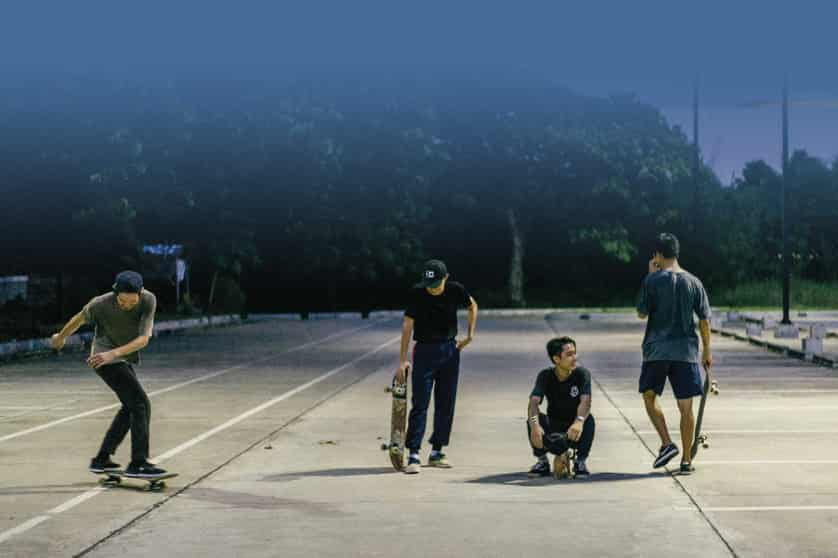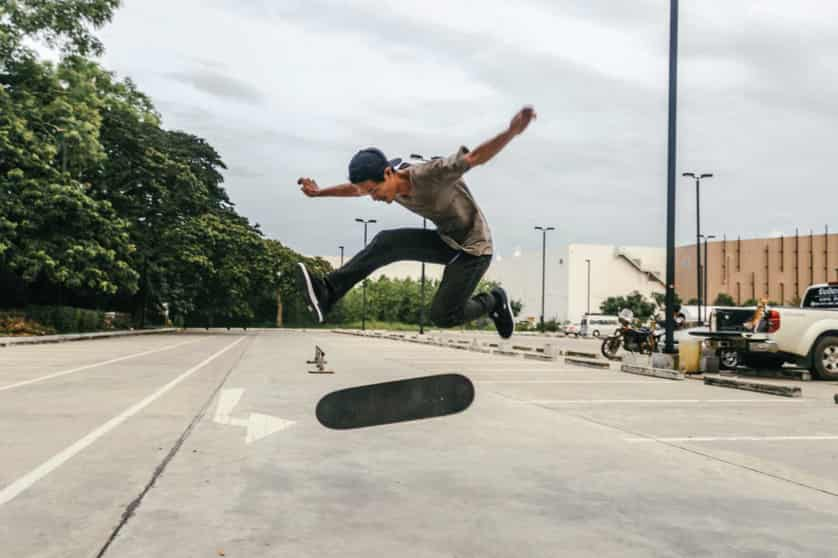“It’s about time that skateboard players are perceived as serious sport players,” said 38 year old Pichai ‘Kob’ Booncoomyou, one of Chiang Mai’s skateboarding pioneers who has spent the past few decades fighting for space and legitimacy for his sport. He began skateboarding at a time when western teens skateboarded from playground to sports arenas, while Thailand, with its potholed pavements and limited access to good skateboards, was still many years, if not decades, from catching up.
The First Push
Kob recalls with crystal clarity his early days of the sport, having picked up his first skateboard at eight years old. “I saw older kids skating around town and wanted to try it myself,” said Kob. “Despite the fact that skateboards were hard to come by in Chiang Mai, I managed to get hold of some pretty basic equipment and started learning what I could.” Those were pre-internet days and there was almost no way to learn skills, techniques and tricks apart from copying friends, catching occasional glimpses on TV or through painful trial and error. “There were about 10 of us who first came together at the newly opened Kad Suan Kaew in 1995 after they offered us free space to skate. It was nothing fancy, just a plain space with an open floor with a few rails but it was a start, and we were very grateful.” In just six months the number of skaters had skyrocketed to over 100.
“With so many of us, it’s unsurprising looking back, that there were so many complaints made against us thanks to reckless and disrespectful skaters,” Kob continued. “Yet despite all that we managed to stay at Kad Suan Kaew for eight years.”
“We were all young, reckless, stubborn and proud of our skills, and frankly we eventually got out of hand, including me — regretfully,” said Kob. “If things were broken, nobody would own up, our egos got the better of us and we started to act like we owned the place. What we forgot was that it was still a shopping mall and not a skate park. We didn’t respect that.” The inevitable happened, and in 2003 Kad Suan Kaew had had enough and outright banned skateboarders from its grounds. Over the next year many skaters gave up or moved onto other hobbies as there was nowhere else to play. Kob was about to give up himself when he met Pich ‘Tum’ Potarach while playing basketball one day. The two discovered a mutual interest in skating and decided to do something about it.
A New Start
The pair finally found a place to skate at Chiang Yuen temple. “Around that time, Kad Suan Kaew also did a U-turn and decided to open a skate park in partnership with Red Bull,” continued Tum. “However, they were charging 50 baht a go which was prohibitive for most of us who wanted to skate every day.” Unfortunately neither Red Bull nor Kad Suan Kaew were willing to pay anything towards maintenance and the park quickly fell to disrepair. Fortunately the duo managed to expand the Chiang Yuen temple crowd and get the community back together again. “We were skating after school hours daily in those days,” said Tum who said that temple school students would become excited at the daily sight of the skateboarders…while teachers grew anxious.

“Wat Chiang Yuen’s students had long had a reputation as delinquents,” said Kob. “But surprisingly, we didn’t have any issues with them at all as they really seemed to take great interest in our activities, spending hours skating rather than fighting and drinking. To be fair, there are skaters who drink and smoke, but not everyone does, just like with any other sport. But still, the teachers distrusted us and saw us as trouble makers — a trend that seemed to span worldwide. They reluctantly allowed us to stay on, but for a price”.
The temple turned into the official Chiang Mai skateboarding base, and the first provincial competition was held there, which helped raise funds to pay the rent. The name ‘Wat Chiang Yuen Skaters’ soon became synonymous with turning problem children into fine and creative young adults,” explained Kob. “TV channels were featuring us and it was a golden age for us skateboarders.”
A Balancing Act
Kob, who is now the owner of Little Cook Café and an aspiring graphic designer, explained that skateboarding has became less popular over the years. Today, the Wat Chiang Yuen Skaters have all but gone, and there are only small pockets of skaters kicking flips and twisting ollys across the city in places like the Chiang Mai Municipality Stadium, the Fine Arts Faculty in CMU and Promenada’s parking lot.
“We tried our best to keep the scene going, at one point we even got the mayor to show interest in building a park. They sponsored a CNX Extreme Day event, then lost interest,” lamented Tum who is constantly struggling to gain legitimacy for his sport.
In 2015, a friend of Tum managed to persuade Maya Lifestyle Shopping Mall to hold a skating event that was aligned with the International Association of Skateboard Companies (IASC) which in turn resulted in local skaters being allowed to meet up regularly outside the front of the mall. “This lasted just five months before a skater was caught skating in an area we were not supposed to and we were kicked out,” Tum said. “I’m actually quite relieved that we were banned. Things were starting to get out of hand as usual and I have grown tired of juggling between the good and the bad kids. I’m happy skating in a quiet corner in Promenada with my friends right now; keeping myself out of the drama.”

Despite his frustration Tum still supports the CNX Heart Skateboard, an online community created by Jirawat ‘Toto’ Navachak that is continuing the fight to lobby local authorities to invest in a proper skate park. “I gathered what I think is necessary for the park proposal. I did a survey collecting statistics about the skaters in Chiang Mai and I even drew a rough design of what the skate park should look like,” explained Toto, who although new to the scene, is now the face of the (once again) growing skateboarding community. “I want to show Chiang Mai that we are just another group of passionate sportspeople.”
So far, the lack of a proper skate park has not stifled the spirits of the city’s hard core skaters. Chiang Mai has even produced its own professional skaters too, such as Sirikit Saelee, a member of the early Kad Suan Kaew gang and now a professional skater for Preduce, and Patarakhun Pianchana, a 28 year old skater who is now sponsored by AI Team who has accumulated a large following online.
For now, the skating community exists and perhaps thrives in bubbles around town; yet it will most likely always live in the shadows of other sports. “Each day I receive at least 10 messages from many people across Chiang Mai,” said Tum, “mostly asking where to skate. When attitudes change, and they are changing, then we will truly flourish.”
Chiang Mai skateboard community Facebook page: cnxheartskateboard
